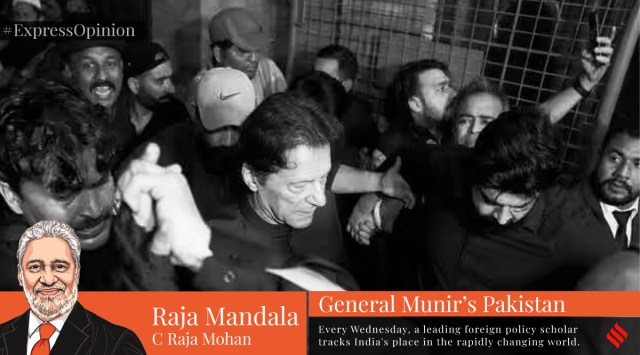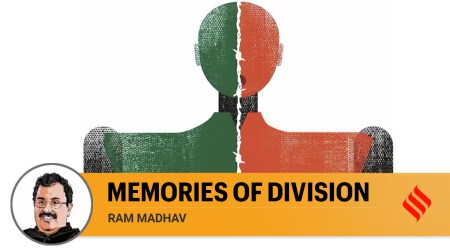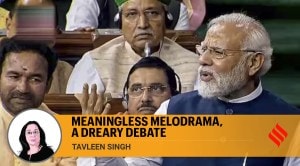C Raja Mohan writes: After Imran Khan’s arrest, Pakistan Army Chief’s challenge
Under General Asif Munir, Pakistan army is moving from meddling in civilian affairs to a hands-on role in day-to-day governance. Delhi must watch closely
 The Army rigged the 2018 elections to install Imran Khan. Imran, however, mistook the Army’s gift as an entitlement and was eventually brought down from office by Bajwa last year. (Express File Photo)
The Army rigged the 2018 elections to install Imran Khan. Imran, however, mistook the Army’s gift as an entitlement and was eventually brought down from office by Bajwa last year. (Express File Photo) For the first time since Pervez Musharraf stepped down 15 years ago to allow the democratic process to return, the army is now seizing a more direct role in running the country’s polity and economy. That opens the question of how India ought to engage with Munir, who is trying to reorient, for good or bad, Pakistan’s political and economic trajectory. On the face of it, the latest developments in Pakistan seem like the repetition of the familiar cycle — Rawalpindi installing civilian leaders in Islamabad and bringing them down at will. Yet, India must pay some attention to the potential new dynamic in Pakistan.
But first, is there a possibility that Imran Khan might yet bounce back? It is a political miracle that you might not want to bet on. A year ago, it seemed that Imran, out of power, was quite a threat to the system, and like the Biblical character Samson, would bring the house down in revenge against his captors. The large popular support for him, including in the ranks of the armed forces, seemed to make him a difficult challenge for the Army. However, slowly but surely, the Army has regained control. Thanks to the overreach by Imran’s supporters, who went on a rampage against army property when he was taken into custody on May 9, Munir had the opportunity to crack down hard. Like his predecessors, Munir has strong support from Imran Khan’s civilian rivals to put him out of action. As always, the Army was well-placed to exploit the contentions among the political class to perpetuate its centrality to the internal political order.
Thinking structurally about Pakistan, though, we might see some discontinuities next door. Munir is trying to end the prolonged instability that followed Musharraf’s rule (1999-2008). That the Army itself is responsible for this instability is true. That does not stop Rawalpindi from trying a different approach to running Islamabad.
Benazir Bhutto, who was allowed to return in 2007, was assassinated shortly after her return. Her husband, Asif Ali Zardari led the PPP to victory in the 2008 elections. In 2013, Nawaz Sharif was elected to power for the third time. Pakistan was settling into a regular electoral cycle, and the peaceful transition from one elected government to another suggested that democracy might finally take root.
The reality was far more turbulent. Musharraf’s successor General Ashfaq Kayani never allowed the PPP government to function effectively, and the judiciary ousted its prime minister, Yusuf Raza Gilani. Kayani’s successor, Raheel Sharif, applied relentless political pressure on Nawaz Sharif by encouraging Imran Khan to mount massive street protests against the elected government. Nawaz was finally removed in 2017 on flimsy charges in a judicial coup backed by the army. The Army rigged the 2018 elections to install Imran Khan. Imran, however, mistook the Army’s gift as an entitlement and was eventually brought down from office by Bajwa last year. Now Munir is trying to make him irrelevant to the political process.
Under Munir, then, Pakistan is moving from the army’s meddling in civilian affairs to a hands-on role in day-to-day governance. This has become necessary, given the multiple crises that Gen Munir is trying to address. These include a deepening economic crisis at home, a mounting terrorist challenge from the Pakistani Taliban, and deteriorating relations with the Afghan Taliban. Addressing these challenges has become harder amidst the declining salience of Pakistan for the major powers. The withdrawal of all US troops from Afghanistan in 2021 saw a precipitous drop in Pakistan’s strategic utility for Washington and more broadly, the West. While China and Gulf countries remain benefactors, Pakistan’s economic weakness and geopolitical setbacks have made it a supplicant rather than a partner.
Munir is returning to the old motto of the Pakistan army — when the going gets tough, the tough get going.
Even as he deconstructs a popular leader like Imran, Munir has inserted himself directly into the management of the economy. He has picked up the unwanted parcel of major economic reform. The civilian leaders, including Imran Khan, had baulked at implementing the IMF proposals that will impose massive pain on ordinary people. Munir appears set to delay the next general elections due this year and use the caretaker set-up to push through unpopular reforms.
To raise additional financial resources from friendly countries to supplement IMF support, he is moving on several fronts. Islamabad is setting up a sovereign wealth fund, a special investment facilitation council, is initiating corporate farming, and bringing new procedures for government-to-government contracts. Together, these instruments will short-circuit the traditional forms of economic governance with no accountability to the big decisions on handing over land, mineral resources, ports, and public sector enterprises to foreign capital, mostly from the Gulf. Critics question the utility of this fire sale of national assets without doing more fundamental economic reforms like India did in the early 1990s. But Munir has rolled the dice.
This week, Munir issued tough warnings to the Tehreek-e-Taliban Pakistan and the Afghan Taliban — who are getting bolder in challenging the writ of the Pakistan state in its western borderlands. Compared to the challenges he faces on the domestic political front, internal security, the western frontier, and the economy, the India account should look least troubling from Rawalpindi’s perspective.
The small number of optimists in Delhi will hope that Pakistan might see cooperation with India as a part of the answer to many of its problems. But the larger numbers of pessimists would say Munir has so much on his plate right now that he will have little bandwidth to make any positive moves towards India. Realists, however, would suggest Delhi must remain open to the possibility of significant economic and political change — either negative or positive — in Pakistan under General Munir. Protecting against the negative outcomes of Pakistan’s internal change and taking advantage of the positive ones must be part of India’s strategy.
The writer is senior fellow at Asia Society Policy Institute, Delhi, and contributing editor on international affairs for The Indian Express
EXPRESS OPINION
More Explained
Aug 13: Latest News
- 01
- 02
- 03
- 04
- 05




































